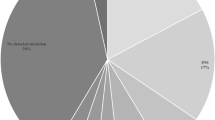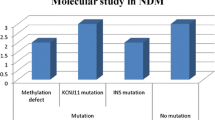Abstract
A recently described type of neonatal diabetes mellitus is caused by mutations in the YIPF5 gene and is combined with manifestations from the central nervous system, including developmental delay, epilepsy, and microcephaly. The molecular pathophysiology behind this phenotype involves the breakdown of the endoplasmic reticulum stress response due to the loss of protein folding capacity. This results in overt diabetes present from very early in life. Herein, we describe a patient with a newly reported variant in the YIPF5 gene, who presented with short events of severe hyperglycemia, induced by the stress of common illnesses, which completely resolved after recovery. We discuss the nature of transient hyperglycemia in the context of the YIPF5 gene variant and compare this phenotype with the previously described cases.


Similar content being viewed by others
References
Skopkova M, Hennig F, Shin B et al (2017) EIF2S3 mutations Associated with severe X-Linked intellectual disability syndrome MEHMO. Hum Mutat 38:409–425. https://doi.org/10.1002/humu.23170
Franco ED, Flanagan SE, Houghton JA et al (2015) The effect of early, comprehensive genomic testing on clinical care in neonatal diabetes: an international cohort study. Lancet 386:957–963. https://doi.org/10.1016/s0140-6736(15)60098-8
Igoillo-Esteve M, Genin A, Lambert N et al (2013) tRNA methyltransferase Homolog Gene TRMT10A mutation in Young Onset Diabetes and primary microcephaly in humans. PLoS Genet 9:e1003888. https://doi.org/10.1371/journal.pgen.1003888
Cnop M, Toivonen S, Igoillo-Esteve M et al (2017) Endoplasmic reticulum stress and eIF2α phosphorylation: the Achilles heel of pancreatic β cells. Mol Metab 6:1024–1039. https://doi.org/10.1016/j.molmet.2017.06.001
Nakagawa H, Hazama K, Ishida K et al (2017) Inhibition of PLD1 activity causes ER stress via regulation of COPII vesicle formation. Biochem Biophys Res Commun 490:895–900. https://doi.org/10.1016/j.bbrc.2017.06.137
Preston AM, Gurisik E, Bartley C et al (2009) Reduced endoplasmic reticulum (ER)-to-golgi protein trafficking contributes to ER stress in lipotoxic mouse beta cells by promoting protein overload. Diabetologia 52:2369–2373. https://doi.org/10.1007/s00125-009-1506-5
Franco ED, Caswell R, Johnson MB et al (2020) De Novo mutations in EIF2B1 affecting eIF2 signaling cause Neonatal/Early-Onset diabetes and transient hepatic dysfunction. Diabetes 69:477–483. https://doi.org/10.2337/db19-1029
Yoshida Y, Suzuki K, Yamamoto A et al (2008) YIPF5 and YIF1A recycle between the ER and the golgi apparatus and are involved in the maintenance of the golgi structure. Exp Cell Res 314:3427–3443. https://doi.org/10.1016/j.yexcr.2008.07.023
Franco ED, Lytrivi M, Ibrahim H et al (2020) YIPF5 mutations cause neonatal diabetes and microcephaly through endoplasmic reticulum stress. J Clin Investig 130:6338–6353. https://doi.org/10.1172/jci141455
Funding
This research did not receive any specific grant from funding agencies in the public, commercial, or not-for-profit sectors.
Conflict of interestNone.
Author information
Authors and Affiliations
Corresponding author
Additional information
Publisher’s Note
Springer Nature remains neutral with regard to jurisdictional claims in published maps and institutional affiliations.
Electronic supplementary material
Below is the link to the electronic supplementary material.
Rights and permissions
Springer Nature or its licensor (e.g. a society or other partner) holds exclusive rights to this article under a publishing agreement with the author(s) or other rightsholder(s); author self-archiving of the accepted manuscript version of this article is solely governed by the terms of such publishing agreement and applicable law.
About this article
Cite this article
Giannakopoulos, A., Chrysis, D. Illness stress-induced transient hyperglycemia in a patient with a novel YIPF5 homozygous missense variant: expanding the phenotype. Hormones (2024). https://doi.org/10.1007/s42000-024-00552-z
Received:
Accepted:
Published:
DOI: https://doi.org/10.1007/s42000-024-00552-z




